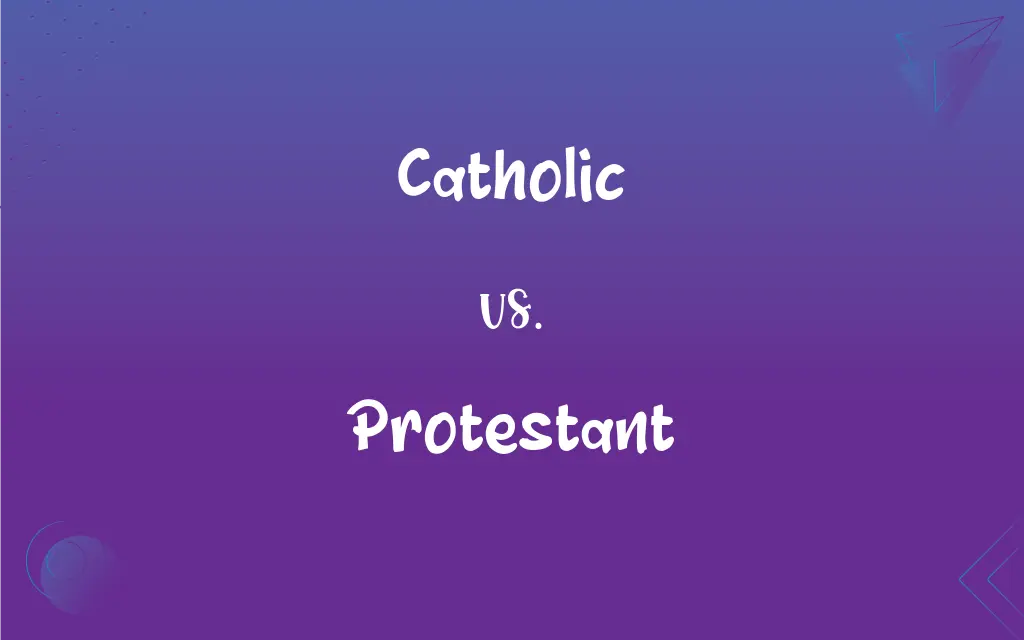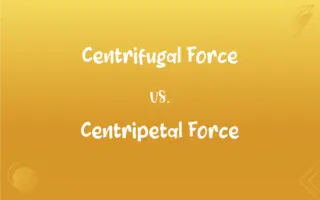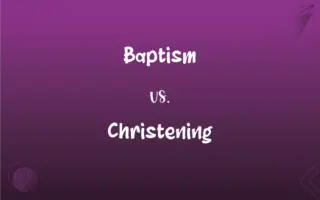Catholic vs. Protestant: What's the Difference?
Edited by Janet White || By Harlon Moss || Updated on October 7, 2023
Catholics adhere to the Pope and sacraments, while Protestants emphasize sola scriptura and individual faith. Both are Christian denominations with divergent beliefs and practices.

Key Differences
Catholics are part of the Roman Catholic Church, headed by the Pope in Vatican City. Protestants belong to a group of Christian denominations formed during the Reformation.
In the Catholic Church, traditions and papal authority are vital. In Protestantism, the focus is largely on the Bible’s authority.
The Catholic Church conducts seven sacraments, including Eucharist and Confirmation. Protestants generally have two (baptism and communion).
Catholics have a firm belief in the real presence of Christ in the Eucharist. Protestants view the Eucharist symbolically, emphasizing remembrance.
Catholics venerate saints and believe in purgatory, concepts generally not found in Protestant theology.
ADVERTISEMENT
Protestants emphasize a direct connection to God, while Catholics might pray through saints for intercession.
Mariology is a distinctive aspect of Catholic belief, with Mary considered sinless and assumed into heaven. Protestants respect Mary but do not ascribe to doctrines like the Assumption.
Catholics use the Deuterocanonical books of the Bible, which most Protestants do not accept.
Comparison Chart
Head of the Church
The Pope
No centralized authoritative figure
Sacraments
Seven sacraments
Mainly two sacraments
ADVERTISEMENT
Authority
Bible, Tradition, and Papal Authority
Primarily the Bible (sola scriptura)
View on Mary
Venerate, Immaculate Conception, Assumption
Respect, no immaculate conception belief
Prayer Intercession
Through Saints
Directly to God
Catholic and Protestant Definitions
Catholic
Catholicism emphasizes the authority of the Pope and church tradition.
The Catholic mass is celebrated universally in a similar manner.
Protestant
Protestants usually engage in two sacraments: Baptism and Communion.
The Protestant Communion service symbolizes the Last Supper.
Catholic
Catholics practice seven sacraments, including Confirmation and Eucharist.
The Catholic belief in transubstantiation is profound and pivotal.
Protestant
Protestants generally do not venerate saints or seek their intercession.
In Protestant theology, prayers are directed straight to God.
Catholic
Catholics venerate saints and believe in their intercessory prayers.
The Catholic Church has canonized numerous saints over centuries.
Protestant
Protestantism prioritizes the Bible as the primary source of authority.
The Protestant Reformation emphasized returning to Biblical foundations.
Catholic
Catholics believe in the immaculate conception and assumption of Mary.
Catholics around the world celebrate the feast of the Assumption.
Protestant
Protestants generally adhere to the belief of “faith alone” for salvation.
The Protestant emphasis on personal faith is foundational to its teachings.
Catholic
Catholic teachings consider the Pope as Christ’s representative on Earth.
Catholics look to the Pope for guidance on moral and ethical issues.
Protestant
Protestants typically reject the authority of the Pope and Vatican.
The Protestant movement started as a protest against papal authority.
Catholic
Of broad or liberal scope; comprehensive
"The 100-odd pages of formulas and constants are surely the most catholic to be found" (Scientific American).
Protestant
A member of a Western Christian church whose faith and practice are founded on the principles of the Reformation, especially in the acceptance of the Bible as the sole source of revelation, in justification by faith alone, and in the universal priesthood of all the believers.
Catholic
Including or concerning all humankind; universal
"what was of catholic rather than national interest" (J.A. Froude).
Protestant
A member of a Western Christian church adhering to the theologies of Luther, Calvin, or Zwingli.
Catholic
Of or involving the Roman Catholic Church.
Protestant
One of the German princes or cities that supported the doctrines of Luther and protested against the decision of the second Diet of Speyer (1529) to enforce the Edict of Worms (1521) and deny toleration to Lutherans.
FAQs
What are the sacraments in Protestantism?
Protestants typically recognize two sacraments: Baptism and Communion.
Do Catholics read the Bible?
Yes, Catholics read the Bible but also follow church traditions and papal authority.
How do Catholics and Protestants view the Pope?
Catholics see the Pope as the vicar of Christ, while Protestants do not recognize papal authority.
Can Catholics pray directly to God?
Yes, Catholics can pray directly to God but also seek intercession from saints.
Which books of the Bible do Protestants reject?
Protestants usually do not recognize the Deuterocanonical books of the Bible, accepted by Catholics.
What is the basis for the Protestant belief of "faith alone"?
The doctrine of "sola fide" comes from a belief in salvation through personal faith in Christ, not by works.
What is the fundamental belief of Catholics?
Catholics believe in the authority of the Pope, the seven sacraments, and the veneration of saints.
How do Protestants view the Bible?
Protestants hold the Bible as the ultimate authority in their beliefs and practices, emphasizing "sola scriptura."
Do all Protestants have similar beliefs?
While core beliefs might be similar, there is a wide range of doctrines and practices across Protestant denominations.
Are all Christian denominations either Catholic or Protestant?
While Catholicism and Protestantism are major branches, there are various Christian denominations outside these categorizations.
How does the Catholic Church view Protestant denominations?
The Catholic Church recognizes the faith of Protestants but sees itself as the true continuation of the Christian tradition.
Do both Catholics and Protestants celebrate Christmas and Easter?
Yes, both Catholics and Protestants celebrate important Christian holidays like Christmas and Easter, although specific traditions may vary.
Why did Protestantism arise?
Protestantism arose during the Reformation, protesting against certain practices and doctrines of the Catholic Church.
What is the Catholic belief about the Eucharist?
Catholics believe in Transubstantiation, where the bread and wine become the body and blood of Christ during the Eucharist.
Why do Protestants not have a Pope?
Protestantism emphasizes a priesthood of all believers and does not have a centralized religious authority like a Pope.
Can Catholics marry Protestants?
Yes, Catholics can marry Protestants, although there may be certain requirements from the Catholic Church.
How do Catholics view Mary?
Catholics venerate Mary, believing in her Immaculate Conception and Assumption.
How do Protestants perceive salvation?
Protestants generally believe in salvation through faith alone ("sola fide").
Do Protestants have saints?
Protestants respect historical Christian figures but generally do not venerate saints as intercessors.
What role do traditions play in Catholicism?
Traditions in Catholicism, alongside the Bible and Papal teachings, play a pivotal role in doctrinal and daily practices.
About Author
Written by
Harlon MossHarlon is a seasoned quality moderator and accomplished content writer for Difference Wiki. An alumnus of the prestigious University of California, he earned his degree in Computer Science. Leveraging his academic background, Harlon brings a meticulous and informed perspective to his work, ensuring content accuracy and excellence.
Edited by
Janet WhiteJanet White has been an esteemed writer and blogger for Difference Wiki. Holding a Master's degree in Science and Medical Journalism from the prestigious Boston University, she has consistently demonstrated her expertise and passion for her field. When she's not immersed in her work, Janet relishes her time exercising, delving into a good book, and cherishing moments with friends and family.































































